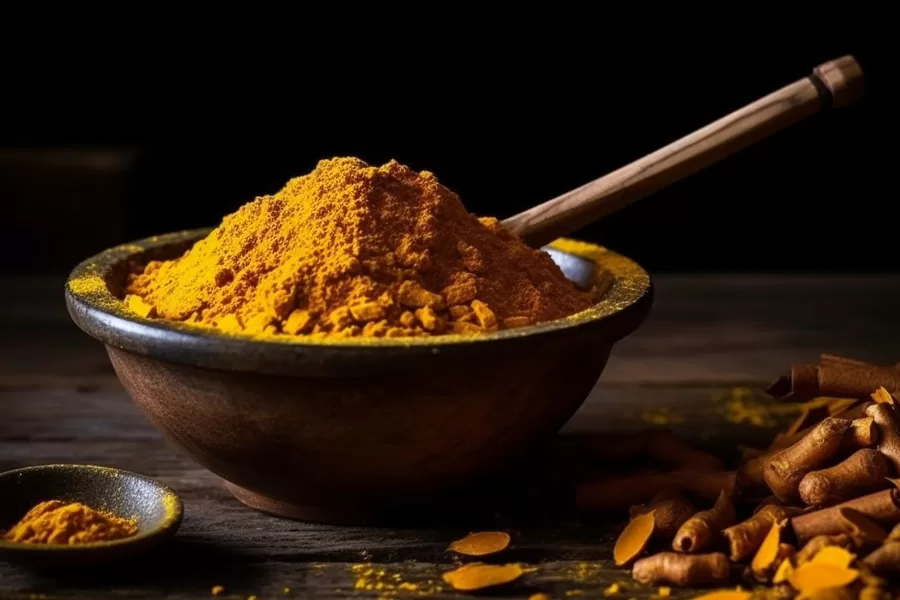
Do you like to add turmeric spice to different dishes? Do you want to know its real effect on your body? What are the benefits, how safe, in what quantities and who should not or should use less of it?
Turmeric is
Curcumin: Turmeric’s Healing Essence
Central to turmeric’s healing attributes is curcumin, the vibrant compound lending the spice its characteristic yellow tint. Famed for its strong anti-inflammatory and antioxidant properties, curcumin is a powerhouse of health. Its effectiveness is amplified when combined with black pepper, whose piperine significantly boosts curcumin’s bioavailability, maximizing its therapeutic potential.
Spanning the Health Spectrum
Turmeric’s array of health benefits is impressively broad. It offers natural relief in inflammatory ailments, including joint discomfort. The antioxidant prowess of curcumin shields the body from harmful free radicals, potentially preventing a range of diseases. Furthermore, turmeric is celebrated for its positive impact on cognitive health, largely attributed to its role in elevating brain-derived neurotrophic factor (BDNF) levels, crucial for brain wellness.
Enhancing Heart Health
Beyond its known benefits, turmeric also plays a significant role in supporting heart health. It enhances endothelial function, a key factor in managing heart health, blood pressure, and clotting processes. This benefit positions turmeric as a natural alternative to certain heart medications. Additionally, the spice is being explored for its potential impact in cancer management, as it may influence tumor growth and metastasis at a molecular scale.
Embracing Turmeric’s Full Spectrum
To sum up, turmeric is a gem in the realm of natural health. With curcumin at its heart, it offers an extensive range of benefits, from combating inflammation and oxidative damage to supporting heart and brain health. While turmeric is generally safe for culinary uses, those considering it as a supplement should consult healthcare professionals, particularly if they have existing health concerns or are on specific medication regimens.
Impact of Curcumin on Testosterone
Testosterone, crucial for both genders, influences muscle strength, bone health, and libido. The role of curcumin, a powerful antioxidant, in affecting this vital hormone is gaining research interest.
Curcumin’s Role in Testosterone Production
Investigations into curcumin’s potential effect on testosterone have revealed its antioxidative properties as a key factor. Oxidative stress can hinder testosterone synthesis; thus, antioxidants play a significant role in maintaining hormonal balance. By mitigating oxidative damage, curcumin might aid in sustaining or even boosting testosterone production.
Effects on Male Health
In males, where testosterone is a primary hormone, its adequate levels are essential for physical vigor, sexual well-being, and mood stability. Initial studies have hinted that supplementing with this golden spice’s extract could support testosterone levels, thereby enhancing muscle functionality and reproductive health. However, the scientific community acknowledges the need for more comprehensive studies to confirm these findings.
Influence on Female Hormonal Health
Although women have testosterone in smaller quantities, its role remains vital for muscle maintenance, bone density, and emotional well-being. The potential benefits of this spice’s extract in harmonizing hormonal levels could extend to women’s health, contributing to overall wellness. Nevertheless, the specific impact on female testosterone and hormonal equilibrium warrants further scientific scrutiny.
Individuals considering supplements based on this spice for hormonal health should first seek advice from healthcare professionals, particularly when dealing with hormone-related issues.
Turmeric’s Influence in Weight Management
Curcumin’s Influence on Adipose Tissue
The spice’s secret weapon in weight management is curcumin, its most active component. Current research posits that curcumin may impede the growth of fat tissue and promote the dissolution of existing fat. This dual functionality is gaining attention as a pivotal factor in weight loss methodologies.
Boosting Metabolism with Curcumin
A key element in weight loss is metabolic efficiency – the body’s ability to utilize energy. There’s growing evidence suggesting that this spice can potentially elevate the body’s metabolic function, thereby possibly leading to a more effective caloric burn and contributing to weight loss efforts.
Combatting Obesity-Related Issues
This spice’s value in weight loss also includes its anti-inflammatory and antioxidant effects. These are believed to help in tackling obesity-related conditions, such as chronic inflammation and oxidative stress, which often contribute to weight gain and metabolic imbalances.
Scientific Insights into Turmeric’s Effect on Body Composition
- Turmeric’s Active Compound: Curcumin, the active compound in turmeric, is the primary agent behind the spice’s health benefits, particularly in weight management.
- Reduction in Body Weight and Fat Percentage: Several studies have documented that curcumin supplementation can lead to significant reductions in body weight and fat percentage, making it an effective component in weight management strategies.
- Improvements in BMI and Waist Circumference: Research findings suggest that curcumin not only reduces weight and fat but also positively affects Body Mass Index (BMI) and waist circumference, which are critical indicators of health.
- Potential Synergy with Balanced Nutrition and Exercise: Integrating turmeric and curcumin supplementation with a regimen of balanced nutrition and consistent exercise may amplify the benefits for weight management, suggesting a holistic approach to health.
Embracing the Yellow Spice in Everyday Life
Known for imparting a bright hue and a distinct taste, it transcends traditional uses, adding zest to a variety of dishes. This spice is not only essential in curry recipes but also acts as a natural dye for various foods.
Try enriching your vegetable roasts with its sprinkles, or liven up grain-based meals with a dash of its color and taste. It adds a special touch to meat and fish marinades, offering an unusual flavor profile. In liquid dishes like soups and stews, it brings a warm color and depth of flavor. For a calming drink, brew a tea infused with this spice or prepare a nourishing ‘golden milk,’ mixing it with milk, sweeteners, and other spices like cinnamon or ginger.
Benefits of Yellow Spice Supplements
The health-enhancing properties of this spice extend into its concentrated supplement forms, such as capsules, tablets, or extracts. These supplements provide a high concentration of the spice’s active components, particularly beneficial for those seeking specific health benefits.
However, using these supplements requires careful consideration. They can have interactions with certain medications and may not be suitable for everyone. People taking medication that affects blood coagulation, for example, should be cautious due to the potential additive effects of these supplements. Those with specific digestive system conditions should also consult health professionals before starting a supplement regimen with this spice.
Maximizing Benefits and Minimizing Risks
When adding this exotic spice to your diet, it’s important to consider its potent staining ability. To fully harness its health potential, pairing it with black pepper is advisable. The compound piperine in black pepper significantly boosts the absorption of the spice’s active ingredients, enhancing their effectiveness.
To conclude, the exotic yellow spice offers a unique blend of flavor and potential health benefits. Whether used in culinary endeavors or as a supplement, careful consideration and consultation with healthcare experts are recommended, especially when used for targeted health benefits.
Understanding Its Side Effects
Widely acclaimed for its medicinal properties, this golden-hued spice is generally safe for most but does warrant caution under certain circumstances. Its use in culinary quantities is typically harmless, but higher doses, particularly in supplement form, may lead to several adverse effects.
Key Side Effects to Note:
- Gastrointestinal Issues: Upset stomach, nausea, diarrhea
- Liver Health Risks: Potential impact from excessive consumption
- Blood Sugar Reduction: Concern for those with diabetes or on certain medications
Drug Interactions of Concern
Interaction with specific medications is an important consideration when using this spice, especially in concentrated supplement form. Due to its natural blood-thinning characteristics, it can enhance the effects of anticoagulant and antiplatelet medications, thereby increasing bleeding risks. Furthermore, it could affect the absorption and efficacy of drugs intended to control stomach acid, and may disrupt the balance in those on medication for acid reflux or ulcers. Its impact on blood sugar levels also necessitates caution in individuals using diabetes medications, as it might intensify their hypoglycemic effect.
Guidance for Vulnerable Groups
Certain groups require extra vigilance regarding their intake of this spice. Pregnant and nursing women are recommended to limit their use to culinary amounts, as high dosages carry potential risks. For those with gallbladder conditions, abstaining is advisable since it could aggravate existing problems. It’s also prudent for individuals scheduled for surgery to cease supplement use a couple of weeks prior to their procedure to avoid complications from its blood-thinning properties.
Safe Usage Recommendations
Incorporating the spice into daily meals can be a beneficial and enjoyable practice for most. However, when considering elevated doses or supplements, it’s crucial to seek advice from a healthcare professional. This is particularly important for individuals with pre-existing health conditions or those on medication, to prevent adverse interactions and side effects.
In conclusion, while this golden spice is renowned for its health benefits, being cognizant of its side effects and interactions is essential for responsible usage. Consulting healthcare providers and adhering to recommended guidelines ensures one can harness its benefits safely and effectively.
Conclusion
The vibrant yellow compound in turmeric, curcumin, excels in diminishing inflammation and shielding against oxidative harm, with black pepper enhancing its absorption. Encompassing a range of benefits, turmeric aids in bolstering joint, brain, and heart health, with potential roles in modulating body weight and hormone levels. Supplemental use of turmeric requires careful consideration, especially for expectant individuals, people under medication, or those with certain health concerns. Seeking guidance from health experts is essential prior to integrating turmeric supplements into health routines, to mitigate potential side effects and drug interactions.
FAQs
Turmeric, with its strong anti-inflammatory properties, plays a significant role in alleviating joint discomfort and improving joint function.
Curcumin in turmeric supports brain health by elevating BDNF levels, which is crucial for cognitive functions and may slow down brain aging.
It helps in maintaining endothelial function, crucial for heart health, aiding in better blood circulation and reducing clot risks.
Yes, studies indicate that turmeric, particularly curcumin, positively influences metabolic functions and body fat regulation, aiding in weight control.
Particular attention is needed for those with health conditions, under certain medications, or pregnant, advising consultation with healthcare professionals before using turmeric supplements.







